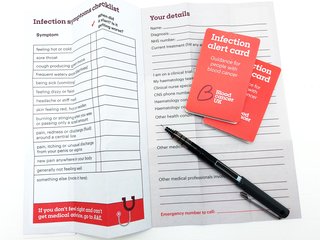Managing your infection risk
Understand more about your immune system, how it's affected by blood cancer and what you and others can do to lower your risk of infection.
What is immunosuppression?
Understand how blood cancer and different blood cancer treatments affect your immune system. Ask your hospital team about your own situation.
Learn more
Preventing infection
There are medicines that can help prevent infection, but there are also things you can do to minimise your risk and feel a little more in control.
Lower your risk

Telling other people
You may need to tell the people closest to you about your infection risk. They will want to keep you safe and can help out in an emergency.
What to say

Protecting someone with blood cancer from infection
Share this information with family, friends colleagues and neighbours so they can help you avoid infection and get medical advice when you need it.
Share this page

Order your free infection alert cards
With our pocket guide you can record infection symptoms and personal details to share with medical staff. Find out what to do and what to say if you go to A&E.
We would like to thank Haematology Consultants Dr Ailsa Holroyd and Dr Piers Patten, Lead Nurse Jodie Nightingill and Advanced Nurse Practitioner Amanda Lane for checking the accuracy of our information about managing infection risk.
This information has been accredited with the PIF TICK, the UK's only quality mark for trusted health information.
Published November 2024. Next full review due November 2027. We make factual updates to the information throughout this period.
